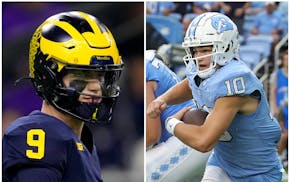The college football season kicks off in less than two weeks, and under different circumstances, this would be a celebratory ramp-up in anticipation for the Big Ten Conference.
Both Ohio State and Wisconsin look playoff-caliber. Five conference teams could be ranked in the top 15 nationally. The state of Nebraska is gaga over Scott Frost's homecoming. The Big Ten East might be the strongest division in college football, and the conference boasts three legitimate Heisman Trophy candidates.
And yet the Big Ten hardly feels awash in feel-good pride at present. Not in light of crises at multiple schools resulting in waves of negative publicity and unanswered questions.
A Maryland football player died of heat stroke during offseason workouts after receiving alarmingly inept medical care by the school's athletic training staff. Ohio State's Urban Meyer and Maryland's DJ Durkin remain on administrative leave from their schools pending investigations into troubling allegations. And the damage inflicted by Michigan State doctor Larry Nassar's reprehensible abuse of gymnasts is immeasurable.
The Big Ten office said Commissioner Jim Delany was unavailable for an interview this past week, but one can only imagine his level of anger and disappointment over these situations, especially knowing that Delany once noted that his conference had "moral authority" to punish Penn State over the Jerry Sandusky scandal.
Ohio State's investigation into Meyer and his handling of domestic violence allegations involving assistant coach Zach Smith is expected to be completed Sunday, with findings released soon thereafter. The school must decide whether to punish Meyer if — as he suggested in a statement after being placed on leave — he followed proper protocol in notifying his boss of accusations made by Smith's wife.
This case has exposed a fierce divide of opinion on Meyer's culpability and who, in addition to Smith, should be blamed for this ugly mess. The school's investigation should provide more clarity about what happened and how it was handled.
In terms of Meyer's role, something remains bothersome: Why did he initially lie to reporters at Big Ten media day about having any knowledge of the alleged abuse in 2015? Meyer later admitted in a statement that he knew about it, saying he was caught off-guard by questions about Smith, who was fired this summer.
It's not a crime for a coach to lie to reporters — and thus the public — but it's certainly a bad look and invites suspicion about his motives.
University of Maryland officials spoke with extraordinary candor this past week in addressing the death of football player Jordan McNair. President Wallace D. Loh said the university takes "legal and moral responsibility" for mistakes made by the athletic training staff when McNair began experiencing problems. Sadly, this tragic outcome was avoidable considering all the information available now related to best-practice protocols.
It's inconceivable that Durkin can or should keep his job after McNair's death and a subsequent ESPN report that uncovered a "toxic" environment inside the program.
ESPN interviewed current and former players and staff members who described what can be labeled as barbaric treatment of players by the staff, in particular strength coach Rick Court, who resigned with a severance package. ESPN cited instances in which coaches verbally humiliated and bullied players to the point that one player was forced to eat until he vomited.
Football will always feature an element of machismo. Coaches push players to their brink to foster toughness. One's willingness to overcome fatigue and physical punishment serves as football's badge of honor.
But what allegedly happened at Maryland falls outside that realm. There is a distinguishable difference between coaching players hard and ignoring their welfare through intimidation. Court is accused of throwing small weights at players when he became angry.
Durkin's firing is inevitable, and warranted, because he's responsible for creating the culture inside his program. Two years ago, Indiana coach Kevin Wilson resigned after being investigated for his treatment of injured players. Illinois fired coach Tim Beckman just before the 2015 season began over his handling of injured players.
The message should be clear by now. Old-school bullying isn't an acceptable form of motivation anymore.
Meyer and Durkin will learn their fates any day as their teams prepare without them. Whatever the outcome, scars will remain long after the season begins.
Chip Scoggins • chip.scoggins@startribune.com
Scoggins: Why 'championship or bust' fits these Wolves

Scoggins: Anatomy of a game-saving play as Correa throws out Ohtani

Scoggins: McCarthy or Maye? Ex-U coach breaks down Vikings' options
Scoggins: Cory Provus getting ready for 'biggest challenge' of career

